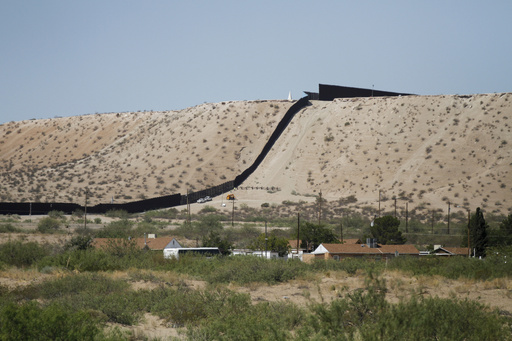The dynamics of immigration are observed differently from the rear terrace of Ardovino’s Desert Crossing restaurant in Sunland Park, New Mexico. Robert Ardovino witnesses firsthand the presence of a Border Patrol horse trailer rolling through his property and the sight of a surveillance helicopter hovering above. He also sees migrants, often guided by smugglers, scaling a border wall or Mount Cristo Rey, stepping into an uncertain future in a region where reports of exhaustion-related deaths are alarmingly common.
The intensity of the immigration issue is particularly pronounced in certain districts along the southern U.S. border that could influence which party controls Congress. Three out of 11 congressional races in border districts are highly contested rematches that flipped in 2022 with the election of Democratic Rep. Gabe Vasquez in New Mexico and Republican Reps. Juan Ciscomani in Arizona and Monica De La Cruz in Texas.
Ardovino, a business partner in a family-owned enterprise, resides in a Texas border district and operates in New Mexico’s Vasquez’s district. Disheartened by the collapse of a bipartisan border bill in February, he emphasizes the need for facts and a comprehensive approach that acknowledges the challenges faced by both border agents and migrants fleeing oppressive regimes.
Border politics in Sunland Park, where early voting commences on October 8, are intertwined with matters of life and death. Notably, there has been a surge in migrant deaths from heat exposure along New Mexico’s nearly 180-mile border segment, further exacerbated by brutal smuggling cartels.
In the Texas race, Democratic contender Michelle Vallejo has taken a firm stance on border enforcement, surprising progressive allies in her bid to unseat De La Cruz. Vallejo advocates for bipartisan cooperation to bolster Border Patrol presence and combat human trafficking cartels, recognizing the chaos at the border and the urgency for action.
Meanwhile, Republican incumbent Ciscomani in Arizona prioritizes border enforcement but distances himself from former President Trump’s inflammatory anti-immigrant rhetoric. His own immigrant background informs his commitment to upholding the law while acknowledging the community’s immigrant roots and shared pursuit of opportunities.
Notably, voters in border regions harbor legitimate concerns about smugglers and contraband, alongside the benefits of authorized cross-border trade and commuting. Border patrol arrests at the southwest border experienced a notable decline in July, particularly due to heightened enforcement by Mexican authorities and temporary suspension of asylum processing by President Joe Biden.
Vasquez in New Mexico, aiming to secure the first Democratic reelection in his district since 1978, emphasizes legislation to enhance fentanyl detection, disrupt cartel recruitment, and improve migrant detention center conditions. In contrast, Republican Herrell, seeking a fourth term, voices concerns about a perceived chaotic border scene and criticizes Democrats on election integrity issues.
Ultimately, incumbents like Vasquez and Ciscomani, while ideologically divergent, have collaborated on bills to address various challenges on the border. Despite differing viewpoints, there are indications of shared efforts to tackle specific issues, illustrating the complexity and nuances of border politics amidst the diverse needs and perspectives of residents in these regions.


